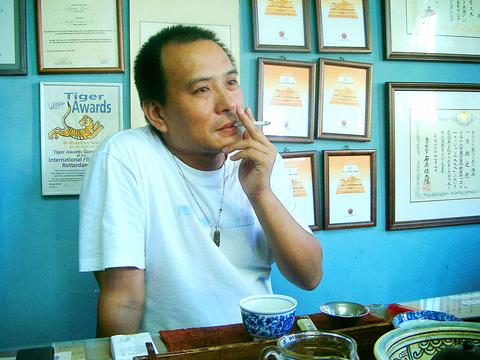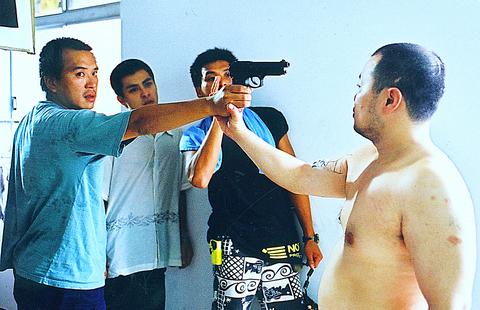Chang Tso-chi (張作驥) sits in his not-very-fancy film studio preparing the music for his film, discussing with his wife whether or not he should go to Venice. He hates wearing suits and the whole red-carpet thing. It sounds true to form for Chang, who wears boxer shorts purchased from the night market, smokes cigarettes and chews betel nuts while talking with the Taipei Times. At the same time he makes very fragrant green tea to treat his guests.
Chang's own persona seems not far removed from the characters in his films, very ordinary but with a distinct personality and a bit of a gangster spirit.
His films have a similar flavor. Ah-chung (忠仔), his first movie seen overseas, centers around a group of teenage boys participating often gang-related Taoist temple ceremonies. His second, Darkness and Light (黑暗之光), is about a girl living with her blind parents who falls in love with an outsider only to see him killed in a gangland clash. The film won Chang the Gold Award and Tokyo Grand Prix at the 1999 Tokyo Film Festival. It has taken the past two years to present his latest work, The Best of Times (美麗時光), which has been selected to compete at this year's Venice Film Festival and is considered a strong contender to snatch the Golden Lion Award.

PHOTO: YU SEN-LUN, TAIPEI TIMES
Again, it's a film about teenagers growing up in poverty and sickness, surrounded by gangsters and family discord.
Making it work
The topic may not sound particularly fascinating as Chang's predecessors such as Hou Hsiao-hsien (侯孝賢) have works of a similar style of realism with stories about people living at the edge of the society. But The Best of Times makes it work brilliantly with sincere emotions, fluid storytelling and a little bit of fantasy that gives the film a feel of magic realism. Film critic and festival organizer Jane Yu (游惠貞) called film the most profoundly touching and humorous Taiwanese film about growing up since Hou Hsiao-hsien's All the Youthful Days (風櫃來的人,1983) and The Time to Live and the Time to Die (童年往事,1985).

PHOTO COURTESY CHANG TSO-CHI FILMS PHOTO
"I grew up in a mainlander family in Chiayi but I always hung out with Taiwanese and Hakka friends. I've been fascinated with gangster culture and their language. I don't understand the language, but they have a particular rhythm," Chang said. In The Best of Times, two 19 year-old boys grow up in a similarly mixed ethnic background. One of the boys, Jie, has a mainlander veteran father so he speaks in a Shangdong dialect with his father and Taiwanese with his friends. Jie's cousin, Wei, is Hakka. Whenever the family has dinner together, it becomes a tumultuous mixed-language environment, an environment that could evoke childhood memories for many Taiwanese with a similar background.
In taking two years to make The Best of Times, Chang did not waste his time. The much-praised truthful feelings rendered between the two boys weren't achieved through inspired acting but are the result of more than four months of military-like training. The actors, Fan Chi-wei (范偉) and Kao Meng-jie (高盟傑), had to live together with the director and crew in the studio. Everyone took turns being on duty for the day, buying food and cooking for everyone at a round-table dinner. Kao and Fan were often asked to run around the streets in the rain for no reason. They were made to shout out their names in the rain so that the director could hear them a few blocks away. In studying his character, Kao was sent to learn magic from Taiwan's master magician and also required to join a Taoist chanting group at the temple everyday. Fan, a Bruce Lee fan, is said to have excelled at using nun-chuks after months of training. But apart from that, he spent two months as a volunteer caretaker in a cancer ward in order to portray the role of Wei, whose twin sister suffers from leukemia.
"It's not the longest training we've had. We normally training for over six months," Chang said.
Another hard training for the boys was a diving scene in the last three minutes of the film. It took eight months for the two actors to be ready to shoot those three minutes. "We first trained them in the 3m-deep pool, and then to 5m, then we went to Lungtung on the northeast coast and finally to Orchid Island, where there are more tropical fish and coral reefs, but the water is also deeper and more dangerous," Chang said. In order to accomplish a shot with the two boys swimming talking and playing kung fu under water they were asked to wear lead belts, but still look as though they were happily playing in the water.
Because Chang demanded to have fish surrounding the actors, Fan and Gao were asked to hold dead shrimp and bread in their mouths. "There was one time Gao didn't adjust well to the pressure and came up with his nose and ears bleeding. Several times the actors felt they could not take it and lost their tempers on the set," Chang said.
Not just a job
Given the cast and crew's experience making The Best of Times, it was more than simply a job, but rather like an intense life lesson given by Chang. "We used the best methods we could to get the best shots we could get. Some professional colleagues said we were crazy. For such an underwater shot, people usually build an `under-the-sea set' in a swimming pool. That would have cost an extra NT$1 million," Chang said.
Chang always prefers to cast non-professional actors. He met the blind people he cast in Darkness and Light on the street. For the role of the father in The Best of Times, he found real veteran mainlanders in the parks frequented by senior citizens. "There is a quality and story in those people. I always love to explore and re-present them," Chang said.
From Ah-chung, to Darkness and Light and The Best of Times, Chang's films have gradually become the standard-bearers for male-bonding stories. "I guess I'm better at telling boys' stories," he said.
Not just boys, though. In Chang's films there are always characters under 20 years old, as well as characters more than 50 or 60-years-old. "The ages in between are always missing. I don't know why," he added.
It's not surprising then to learn that his next project will be about a friendship among four people: two Taiwanese boys, a Tao Aborigine boy and a tomboy girl. "It will be set in the 1960s, in the alleys of a veteran's community," he said.
Always gazing at boyhood and the spirit of youth set with a nostalgic touch in an ordinary environment, Chang Tso-chi has created a film language all his own.
For your information:
The Best of Times is to be released Sept. 21 at the Majestic Theater in Taipei with two special screenings of Ah-chung and Darkness and Light. Advance tickets are available starting Saturday, Aug. 24 at Taipei's Kingstone Bookstores. For more information call (02) 2933-4608.

In the March 9 edition of the Taipei Times a piece by Ninon Godefroy ran with the headine “The quiet, gentle rhythm of Taiwan.” It started with the line “Taiwan is a small, humble place. There is no Eiffel Tower, no pyramids — no singular attraction that draws the world’s attention.” I laughed out loud at that. This was out of no disrespect for the author or the piece, which made some interesting analogies and good points about how both Din Tai Fung’s and Taiwan Semiconductor Manufacturing Co’s (TSMC, 台積電) meticulous attention to detail and quality are not quite up to

April 21 to April 27 Hsieh Er’s (謝娥) political fortunes were rising fast after she got out of jail and joined the Chinese Nationalist Party (KMT) in December 1945. Not only did she hold key positions in various committees, she was elected the only woman on the Taipei City Council and headed to Nanjing in 1946 as the sole Taiwanese female representative to the National Constituent Assembly. With the support of first lady Soong May-ling (宋美齡), she started the Taipei Women’s Association and Taiwan Provincial Women’s Association, where she

Chinese Nationalist Party (KMT) Chairman Eric Chu (朱立倫) hatched a bold plan to charge forward and seize the initiative when he held a protest in front of the Taipei City Prosecutors’ Office. Though risky, because illegal, its success would help tackle at least six problems facing both himself and the KMT. What he did not see coming was Taipei Mayor Chiang Wan-an (將萬安) tripping him up out of the gate. In spite of Chu being the most consequential and successful KMT chairman since the early 2010s — arguably saving the party from financial ruin and restoring its electoral viability —

It is one of the more remarkable facts of Taiwan history that it was never occupied or claimed by any of the numerous kingdoms of southern China — Han or otherwise — that lay just across the water from it. None of their brilliant ministers ever discovered that Taiwan was a “core interest” of the state whose annexation was “inevitable.” As Paul Kua notes in an excellent monograph laying out how the Portuguese gave Taiwan the name “Formosa,” the first Europeans to express an interest in occupying Taiwan were the Spanish. Tonio Andrade in his seminal work, How Taiwan Became Chinese,